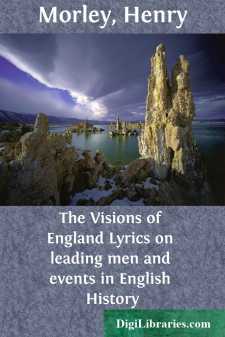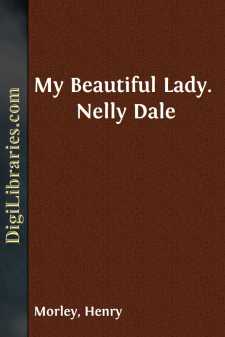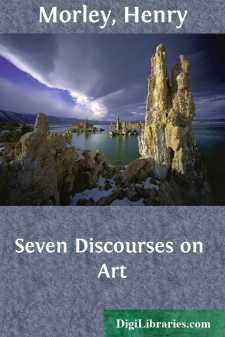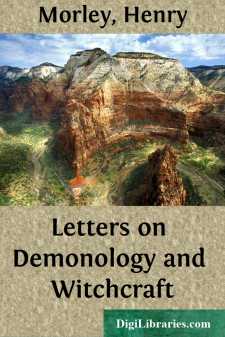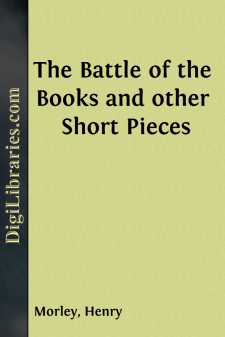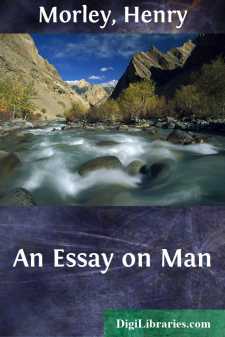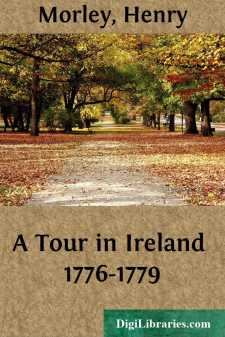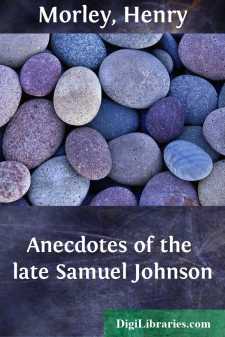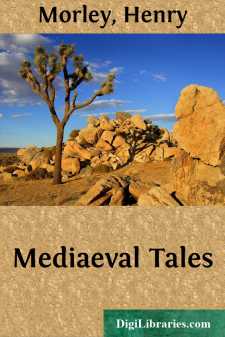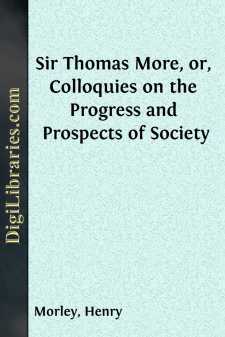Categories
- Antiques & Collectibles 13
- Architecture 36
- Art 48
- Bibles 22
- Biography & Autobiography 813
- Body, Mind & Spirit 142
- Business & Economics 28
- Children's Books 15
- Children's Fiction 12
- Computers 4
- Cooking 94
- Crafts & Hobbies 4
- Drama 346
- Education 46
- Family & Relationships 57
- Fiction 11828
- Games 19
- Gardening 17
- Health & Fitness 34
- History 1377
- House & Home 1
- Humor 147
- Juvenile Fiction 1873
- Juvenile Nonfiction 202
- Language Arts & Disciplines 88
- Law 16
- Literary Collections 686
- Literary Criticism 179
- Mathematics 13
- Medical 41
- Music 40
- Nature 179
- Non-Classifiable 1768
- Performing Arts 7
- Periodicals 1453
- Philosophy 64
- Photography 2
- Poetry 896
- Political Science 203
- Psychology 42
- Reference 154
- Religion 513
- Science 126
- Self-Help 84
- Social Science 81
- Sports & Recreation 34
- Study Aids 3
- Technology & Engineering 59
- Transportation 23
- Travel 463
- True Crime 29
Henry Morley
Henry Morley was a 19th-century British academic and writer, best known for his contributions to literature and education. He was a professor of English literature at University College London and authored numerous works, including biographical studies and literary criticism. Morley played a pivotal role in popularizing English literature through his editorial work on the influential "Cassell's National Library" series.
Author's Books:
Sort by:
by:
Henry Morley
INTRODUCTION. Again, on behalf of readers of this National Library, I have to thank a poet of our day—in this case the Oxford Professor of Poetry—for joining his voice to the voices of the past through which our better life is quickened for the duties of to-day. Not for his own verse only, but for his fine sense also of what is truest in the poets who have gone before, the name of Francis Turner...
more...
by:
Henry Morley
INTRODUCTION. “A ray has pierced me from the highest heaven—I have believed in worth; and do believe.” So runs Mr. Woolner’s song, as it proceeds to show the issue of a noble earthly love, one with the heavenly. Its issue is the life of high endeavour, wherein “They who would be something moreThan they who feast, and laugh and die, will hearThe voice of Duty, as the note of...
more...
by:
Henry Morley
INTRODUCTION It is a happy memory that associates the foundation of our Royal Academy with the delivery of these inaugural discourses by Sir Joshua Reynolds, on the opening of the schools, and at the first annual meetings for the distribution of its prizes. They laid down principles of art from the point of view of a man of genius who had made his power felt, and with the clear good sense which is...
more...
by:
Henry Morley
INTRODUCTION. Sir Walter Scott's "Letters on Demonology and Witchcraft" were his contribution to a series of books, published by John Murray, which appeared between the years 1829 and 1847, and formed a collection of eighty volumes known as "Murray's Family Library." The series was planned to secure a wide diffusion of good literature in cheap five-shilling volumes, and...
more...
by:
Henry Morley
Jonathan Swift was born in 1667, on the 30th of November. His father was a Jonathan Swift, sixth of the ten sons of the Rev. Thomas Swift, vicar of Goodrich, near Ross, in Herefordshire, who had married Elizabeth Dryden, niece to the poet Dryden’s grandfather. Jonathan Swift married, at Leicester, Abigail Erick, or Herrick, who was of the family that had given to England Robert Herrick, the...
more...
by:
Henry Morley
Pope’s life as a writer falls into three periods, answering fairly enough to the three reigns in which he worked. Under Queen Anne he was an original poet, but made little money by his verses; under George I. he was chiefly a translator, and made much money by satisfying the French-classical taste with versions of the “Iliad” and “Odyssey.” Under George I. he also edited Shakespeare, but...
more...
by:
Henry Morley
INTRODUCTION. Arthur Young was born in 1741, the son of a clergyman, at Bradfield, in Suffolk. He was apprenticed to a merchant at Lynn, but his activity of mind caused him to be busy over many questions of the day. He wrote when he was seventeen a pamphlet on American politics, for which a publisher paid him with ten pounds’ worth of books. He started a periodical, which ran to six numbers. ...
more...
by:
Henry Morley
INTRODUCTION Mrs. Piozzi, by her second marriage, was by her first marriage the Mrs. Thrale in whose house at Streatham Doctor Johnson was, after the year of his first introduction, 1765, in days of infirmity, an honoured and a cherished friend. The year of the beginning of the friendship was the year in which Johnson, fifty-six years old, obtained his degree of LL.D. from Dublin, and—though he...
more...
by:
Henry Morley
This volume of "Mediæval Tales" is in four parts, containing severally, (1) Turpin's "History of Charles the Great and Orlando," which is an old source of Charlemagne romance; (2) Spanish Ballads, relating chiefly to the romance of Charlemagne, these being taken from the spirited translations of Spanish ballads published in 1823 by John Gibson Lockhart; (3) a selection of stories...
more...
by:
Henry Morley
It was in 1824 that Robert Southey, then fifty years old, published “Sir Thomas More, or Colloquies on the Progress and Prospects of Society,” a book in two octavo volumes with plates illustrating lake scenery. There were later editions of the book in 1829, and in 1831, and there was an edition in one volume in 1837, at the beginning of the reign of Queen Victoria. These dialogues with a...
more...


